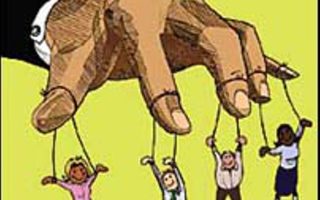Abusers process toxic shame differently than victims of social aggression. It is a biologically inspired truth.
While victims tend to self-reflect and blame themselves for having problems with personal, professional, and romantic relationships, Abusers tend to blame shift compulsively and pride themselves in the thought of having won in what they perceive is nothing more than social competition.
Feeling shameless or without blame is one of the hallmarks of narcissistic thinkers. Those who behave with extreme levels of grandiosity and entitlement typically lack the ability to self reflect, leaving them looking at soulless or only skin-deep reflections of themselves when and if they are asked to do mirror work.
Toxic shame is something all narcissistic parents tend to foster on some level or another in their children. Social aggression is a taught and culturally nurtured, rather than inherently natural biological value.
This pattern or habit is no less damaging in life to people with Cluster B personality types prone to shaming than it is to their scapegoats, targets, and collateral damage victims. But the way Abusers process toxic shame is much different in them than in their victims. Their toxic shame actually trumps that of victims because people with Cluster B personality types are never effectively able to unlearn it.
Narcissistic people are a confusing bunch to figure out. Some are born with neurological conditions that leave them unable to process complex emotions, while others are over-indulged or traumatized early on in life in such a way that it truly retards their emotional and spiritual growth throughout their lives as ‘persons’.
“Because individuals with a true Narcissistic Personality Disorder are contemptuous and shameful of the less-than-perfect aspects of themselves, they cannot tolerate those same aspects in others. Any flaws that they see in another are likely to mirror back their own flaws, and that enrages them. At this point their narcissism has ceased to be a source of healthy self-respect and self-esteem, but rather, it has become a defence of a false grandiose self that needs to be guarded against painful feelings of shame and low self-worth if it is to survive. It is shame or humiliation that is always the underbelly or the driving force behind their narcissistic defenses. Neurotic shame is the root cause of the narcissist’s multi-addictions. Alcoholics Anonymous has long recognised that it is the individual’s grandiosity, self-centeredness, and lack of humility that are the most difficult obstacles to overcome in addictions. False-pride, inflated ego and grandiosity are viewed as defenses against feelings of inferiority and inadequacy. One has to inflate against the intolerable affects of shame…which of course is the cornerstone of the narcissist’s psychopathology. Pathological narcissism occurs in a spectrum of severity. In its more extreme forms, it manifests itself as Narcissistic Personality Disorder (NPD).”
Narcissistic Behavior Network
People who are narcissistic are egocentric, first and foremost. The mildest of narcissistic personality types tend to be co-dependent, self-promoting their own best interest while overlooking how their personal choices, attitudes, and decisions to affiliate themselves with a variety of stronger predators impact their offspring, friends, family members, society at large, or in general other people.
Those who enable Abusers while self-promoting tend to be Covert Narcissists. Ashamed to self-assert but also not willing to give up the social perks of socially supporting toxic people, they are the type who stay long term in bad marriages for their own sake then blame their need to stay on the children.
Such are the men and women of the world who tend to hunt consistently for side pieces and mate replacements as serial cheaters.
They tend to keep an unknowing spouse either doing all the housework and childcare or providing all the finances while they trash talk their partner behind their back in order to elicit a sympathy reaction from those willing to enable as the serial cheater’s gaslighting targets.
Serial cheating is simply something they call their own “human nature”.
[Here’s a hint. Guess what? It’s NOT.]
People who are problem drinkers or problem drug users are also narcissistic — typically by nature if and when they become addicted. Not wanting to miss out on the opportunity to self-indulge or party, they use drugs and alcohol at their own discretion without feeling a need to disclose how much they truly use to anybody.
Anyone who hides drug or alcohol use has a problem with character far more than they do the substances, plain and simple.
Trust a drunk who brags about alcohol intake long before you ever trust a man or woman who pops pills, snorts lines of cocaine, chomps down a fist full of Adderall to enhance a diet, sneaks steroids at the gym to enhance performance, or who keeps bottles of alcohol (or their drug of choice) conveniently stashed away or hidden.
Why are both sorts of people socially dangerous and likely to persistently promote feelings of toxic shame in both their targeted victims and in the minds and hearts of Narcissistic Rivals? Because they feel enough toxic shame themselves to cause them to behave in Machiavellian ways to hide it.
People who cheat and lie about it know the difference between right and wrong.
They want to have their cake and eat it too, metaphorically speaking. So do addicts — including but not limited to people who claim to have sex addictions, those who are alcoholics who are not actively engaged in a meaningful process of alcohol abstinence and psychological recovery, and (again) problem drug users [including but not limited to those folks who choose to over-indulge in illegal substances as well as pill-popping teens, tweens, Valium mommies, and pain pill addicted grandmas and grandpas].
People who situationally abuse people, drugs, alcohol, or their sex partners situationally (including by doing things like sneaking around behind their love interest’s or family members backs while indulging in things like drug or alcohol binges, having affairs, or pretending to be moral in public while privately being deeply involved in socially deviant acts like hiring escorts, going to strip clubs in secret, or over-indulging in porn) know what they are involved in is ethically unacceptable.
But they will be the first to lie about their own true nature and lifestyle in order to hide their involvement while unabashedly pointing the blaming finger at everyone around them.
Take, for example, the religious right. Many “good Christian families” are filled with people who are situational abusers or who live a criminal lifestyle. They get the perks of pretending to be holy while simultaneously they get off on manipulating, behaving in covert manners, and conning everybody.
Children raised by toxic parents might be drug to a church where they are told it’s a sin to fornicate out of wedlock, to covet, to steal, to cheat, or to lie. Then, they watch their parents, grandparents, aunts, uncles, cousins, and siblings do all those things and more… never in public, always in private.
Toxic Shame in an Abuser fills them with a desire to avoid being caught. In a victim, it relates to how the traumatized person is taught how to feel about himself or herself.
In domestic abuse situations, Enablers tell children to overlook abuse and to keep “family secrets” private. Arguably, it’s comparable to working for a company that is polluting the environment in secret but has its employees sign complex waivers that prohibit them from deviating from the practice, stopping it, or ever telling anyone about it.
Scapegoats are typically told directly that no one who is “normal” or a “good person” would ever possibly want to spend time with them or would actually ever be functionally able to love them. When a scapegoat child grows up to be an Abuser, they repeat the gaslighting tale to their victims in an attempt to foster toxic shame and ultimately render them feeling powerless by offering them nothing but undermining discouragement.
When that same sort of targeted offspring is told by a toxic parent that the only way to gain the parent’s approval is by acting like a Copycat, they tend to pull mini-me acts if by nature they are psychologically and emotionally capable of acting like conformists. The only toxic shame they tend to feel is for not being socially vicious enough to please or impress the most toxic of their peer group. Whether that group is friends, work comrades, or family members makes no difference to their victims.
Psych Central notes the characteristics of Toxic Shame. They say, “Toxic shame differs from ordinary shame, which passes in a day or a few hours, in the following respects”, noting the difference between normal, modest and moral conscience and unhealthy or pervasively irrational, toxic shame as follows:
- It can hide in our unconscious or sub-concious, so that we are unaware that we have shame.
- When we experience shame, it lasts much longer.
- The feelings and pain associated with shame are of greater intensity.
- An external event isn’t required to trigger it. Our own thoughts can bring on feelings of shame.
- It leads to shame spirals that cause depression and feelings of hopelessness and despair.
- It causes chronic “shame anxiety” — the fear of experiencing shame.
- It’s accompanied by voices, images, or beliefs originating in childhood and is associated with a negative “shame story” about ourselves.
- We needn’t recall the original source of the immediate shame, which usually originated in childhood or prior trauma.
- It creates deep feelings of inadequacy.
But it’s important to note that typically, one must have the neurological capacity to both feel shame and make extended connections between life experiences and subjective assessment of external stimuli in order to be able to grasp the process.
This is an area where significantly more time and attention must inevitably be addressed by researchers, as it seems pound foolish to attribute the capacity to cogitate with complex relativism to a person who’s Empathy center in the brain is functionally impaired from a neurological perspective.
Whether a person with Cluster B was born with a thinning of the area of the brain where complex emotions like empathy are processed or it withers over time due to lack of use is (from a victim’s standpoint) NOT THE VICTIM’S CARE, CONCERN, or BUSINESS.
If a victim wants to stop being abused, they simply have to stop caring about the why’s of the Abuser and get self-focused on unraveling the mystery of why they (as victims) were or are willing to justify, overlook, or excuse abuses.
How many people have been told the meaning of the phrase, “Forgive them, Lord, for they know not what they do” is supposed to mean forgiving abusers and not holding them socially or morally accountable for harmful behavior is the morally just and right thing to do? It’s not.
Narcissistic predators and their Flying Monkey squad of Enablers would love victims to tolerate abuse and use without complaint. Abusive personality types seldom tolerate situations where they themselves are forced or encouraged to show restraint.
People with Cluster B personality types abuse by habit because they are predatory pack animals by nature. If their brains are not hardwired to behave any differently, being “mad” at them for doing things like lying, using, and abusing is about as productive as being furious at them for something as out-of-their-control as height, skin color, or eye color.
The more victims focus on personalizing abuse rather than seeing it as a symptom of an organism likely to be weeded out of the evolutionary Garden of Eden over time, the less likely they are to heal.
The more likely thing they inevitably are destined to cause in both themselves and other people is Complex PTSD (or “C-PTSD for short) based on cultivating the belief that in order to be moral and love other people unconditionally or in a god-like way that they and those who also live under the thumb of abusive people must forevermore and eternally take shipoopie from their abusers every day.
Don’t fall victim to Enabler’s irrational “self-promotion” logic. There’s no way a person who aids an Abuser in order to self-promote their own interest at the expense of lesser-valued others is likely to slide under the karmic radar.
Abusive people who simply abuse are guilty of the moral crimes they choose to commit directly.
But in some way, they get a karmic hall pass if their biology made them that way. But Abuse ENABLERS — meaning people who have the capacity to act with empathy and compassion as collaborative members of society who choose to compete with their fellow men and women rather than to set healthy lifestyle boundaries that include saying no to overlooking abuse on any level; coupled with a willingness to set their own personal needs aside for the highest and greatest good of all concerned at times — those people are morally as well as spiritually DIRTY.
[And yes, every human is guilty of being one of “those people” at various times throughout our lives. We all make self-serving choices at various stages in life based on doing our dead-level best to ensure a positive outcome based on our subjective ability at any given day or time to factually or accurately process choice using a mix of evidence and complex emotion to analyze our feelings and meter our actions contemplatively while seeking the greatest good in any situation.]
Flying Monkeys who know full well that the people they support are likely to be abusive situationally are the most morally culpable for harming victims. Those who are gaslighting victims themselves (rather than happy-to-assist in abusing targets by proxy in order to win the social favor of a stronger predator) are less “guilty” of willful malice but more karmically responsible due to negligence.
A person raised to feel toxic shame and ENABLE may have been raised to believe any of the following sentiments about themselves, as noted by Psych Central:
- I’m stupid.
- I’m unattractive (especially to a romantic partner).
- I’m a failure.
- I’m a bad person.
- I’m a fraud or a phony.
- I’m selfish.
- I’m not enough (this belief can be applied to numerous areas).
- I hate myself.
- I don’t matter.
- I’m defective or inadequate.
- I shouldn’t have been born.
- I’m unlovable.
A person with a Cluster B personality type might have been told all those things but decide they are better than that. They actually might feel that way in comparison with a Mommy Dearest maternal figure or an Enabling Henchman father figure, but compared to outsiders or strangers measure themselves as deserving to be placed consistently on a pedestal.
Cluster B people think they are smart. The more somatic they are, the more likely they are to obsess over things like looks or social status, constantly striving to compare themselves in a flattering way to everybody.
They think of themselves as the most sexually attractive people on the planet — and they are not afraid to use sex or blackmail to use and abuse other people. Narcy people always consider themselves a paramount of social or moral virtue. For some, that might mean acting hyper-sexual; for others, they may strive to behave as if they themselves are puritanical.
Cluster B people are proud of their ability to con, manipulate, and deceive others. They love to brag about how gullible their targeted marks are… seriously — they all sound like corrupt politicians or the seediest ilk among used car salespeople.
While their victims are busy feeling ashamed of having been targeted and strive to protect their own reputation as well as that of their loved one or person of interest who abused them, they revel in having gotten away with situational abuse as well as actively have assistance with public (as well as private) manipulation.
Victims hate themselves for staying and enduring years of abuse that makes them feel socially, physically, and emotionally unworthy. Abusers simply feel smart, charmed, like they can roll in poop and come up smelling like a rose, and entitled [rather than truly being deserving of accolades that are “perk-y”].
Those pervasively targeted or scapegoated by toxic family as children are the most likely to grow up thinking if they self-advocate, they are not deserving of being allowed to have fundamental human rights respected. The predator only thinks of his or her own best interest and is seldom happy if there’s anything left over for anybody.
Blaming their unhappy childhood for the choices in attitudes and actions as adults is common for people who enjoy abusing. Striving to avoid taking personal responsibility for their actions (or lack thereof in appropriate circumstances where a proper response based on civility or compassion should be expected), they blame shift their decisions onto their parents.
That’s simply not the act of insecure people who feel ashamed by their own behavior (even if they are intellectually rather than emotionally able to realize that whatever action or deed they have done is considered socially inappropriate, abusive by nature, or just downright appalling).
What it reflects is a person who believes their elders are better than everyone, deserving of more, that doo-doo rolls downhill faster than a round stone gathering no moss while plummeting down a steep hill, and that they (as the offspring of monsters) are entitled to their day in the proverbial sun abusing.
The toxic shame a predator feels hinges on their desire to feel almighty and powerful. They all seem to want to outdo their toxic family members when it comes to abusing friends, family, their own offspring, and the general public.
It is a subtle difference to note for sure, one that requires the observer to set aside their own presumptive bias that all human brains process emotional choices and feelings similarly. Figuring out that an Abuser strives to please as well as out-perform a toxic parent who abused them is one of those “first step” ah-ha moments that come in time to most experts who study Cluster B personality types the most carefully, with the least social or cultural bias, and themselves by paying the most respectful of attention to narcissistic personality types with empathy.
Until victims, Abuse Advocates, Mental Health Professionals, and Enablers are willing to seriously factor in that Cluster B handicaps humans emotionally, they are likely to keep acting as if A) predators are capable of having a social or moral conscience that would be strong enough to govern an abuser’s behavior in a profoundly meaningful, truly self-empowering way or B) the Abuser feels toxic shame in the same way a person who has an average brain does on any given day.
But here’s the deal. Despite toxic shame concepts being taught to abuse victims (making them feel like abuse was their fault or they deserved it), the differences between the way people who are kind respond and those who are prone to caustic aggression react are profound.
Cluster B people will never be able to understand the benefit of behaving collaboratively because they themselves are doomed to spend their entire life striving to achieve social, financial, physical, spiritual, psychological, or emotional domination over other people.
They are destined to spend their lives metaphorically living in their predecessor Abuser’s or toxic parent’s shadow, constantly comparing themselves to ill-cosmically fated and ill-tempered, typically unpleasable elders.
Victims of such personality types can educate themselves about personality disorders, learn how to make healthier choices, and can ultimately change their life. The only person any human being ever should learn to functionally compete with is yesterday’s self.
It’s a true social and emotional advantage to have [on an evolutionary scale], being able to recognize what did and did not turn out to be wise emotional choices to make in the past, then to be able to consciously self-reflect and decide to choose for themselves a healthful, more forward-thinking and socially progressive future-thinking based path.
Bottom line, Narcissists and Sociopaths (as well as Histrionics and people with Borderline Personality Disorder) are never likely to be able to do that. They cannot change, have a limited ability to self-reflect and process emotion in a meaningful way, and typically spend a lifetime striving to trump their primary Abuser with regard to status, most commonly an abusive or controlling mom, their self-perceived narcissistic rivals, a golden child sibling, or perniciously obnoxious Major Dad.





